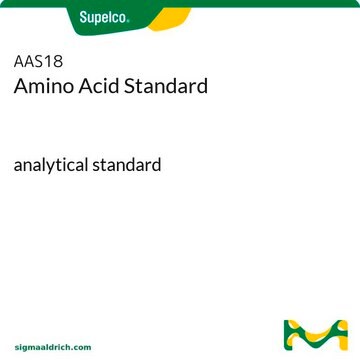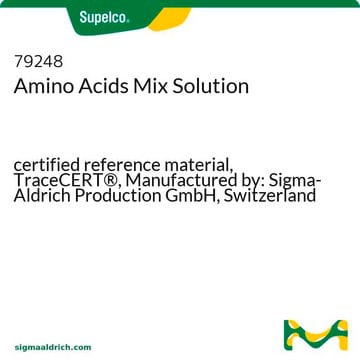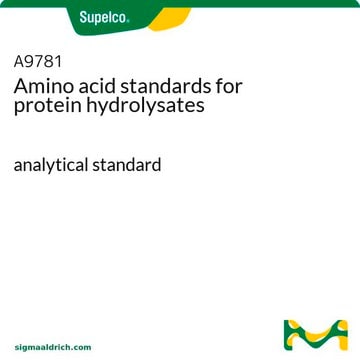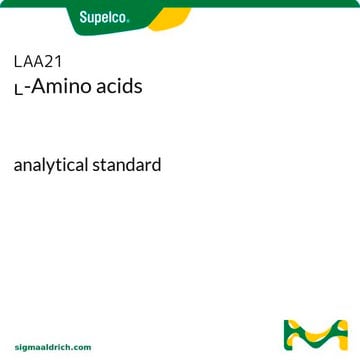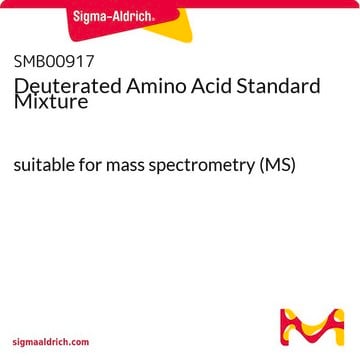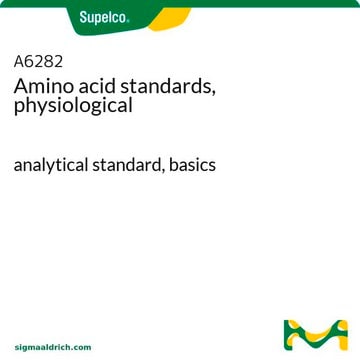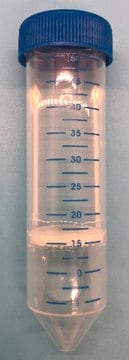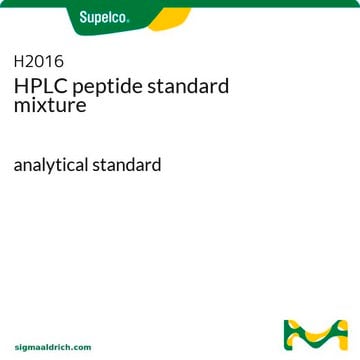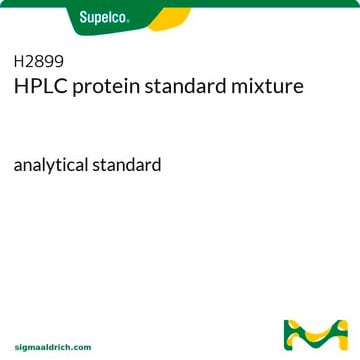A2161
Aminosäurestandards für den Fluoreszenznachweis
analytical standard
Anmeldenzur Ansicht organisationsspezifischer und vertraglich vereinbarter Preise
Alle Fotos(1)
About This Item
UNSPSC-Code:
85151701
eCl@ss:
32160406
NACRES:
NA.24
Empfohlene Produkte
Qualität
analytical standard
chemische Klasse(n) des Analyten
amino acids, peptides, proteins
Methode(n)
HPLC: suitable
gas chromatography (GC): suitable
Anwendung(en)
food and beverages
Format
multi-component solution
Lagertemp.
2-8°C
Anwendung
Refer to the product′s Certificate of Analysis for more information on a suitable instrument technique. Contact Technical Service for further support.
Sonstige Hinweise
je 25 nmol Aminosäure pro mL ausser L-Cystin: 12.5 nmol pro ml.
Qualitative standard. Amino acids and related compounds are in 0.1N HCl.
Analyt
Beschreibung
L-Alanine
Ammonium chloride
L-Arginine
L-Aspartic acid
L-Cystine
L-Glutamic acid
Glycine
L-Histidine
L-Isoleucine
L-Leucine
L-Lysine
L-Methionine
L-Phenylalanine
L-Proline
L-Serine
L-Threonine
L-Tyrosine
L-Valine
Alle anzeigen (18)
Signalwort
Warning
H-Sätze
P-Sätze
Gefahreneinstufungen
Met. Corr. 1
Lagerklassenschlüssel
8B - Non-combustible corrosive hazardous materials
WGK
nwg
Flammpunkt (°F)
Not applicable
Flammpunkt (°C)
Not applicable
Choose from one of the most recent versions:
Analysenzertifikate (COA)
Lot/Batch Number
Don't see the Right Version?
If you require a particular version, you can look up a specific certificate by the Lot or Batch number.
Besitzen Sie dieses Produkt bereits?
In der Dokumentenbibliothek finden Sie die Dokumentation zu den Produkten, die Sie kürzlich erworben haben.
Kunden haben sich ebenfalls angesehen
Somaieh Zafari et al.
Plant physiology and biochemistry : PPB, 99, 11-20 (2015-12-29)
Lead (Pb) is a hazardous heavy metal present in the environment which elicits oxidative stress in plants. To characterize the physiological and biochemical basis of Pb tolerance, Prosopis farcta seedlings were exposed to Hoagland's solutions at six different Pb concentrations
Hannaneh Tashackori et al.
Journal of plant physiology, 232, 115-126 (2018-12-12)
Lignans are diphenolic compounds produced in plants via coupling of two coniferyl alcohol molecules with the aid of a dirigent protein to form pinoresinol (PINO). The latter is reduced via lariciresinol (LARI) to secoisolariciresinol by the bifunctional pinoresinol-lariciresinol reductase (PLR).
Unser Team von Wissenschaftlern verfügt über Erfahrung in allen Forschungsbereichen einschließlich Life Science, Materialwissenschaften, chemischer Synthese, Chromatographie, Analytik und vielen mehr..
Setzen Sie sich mit dem technischen Dienst in Verbindung.